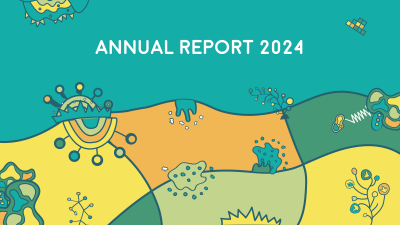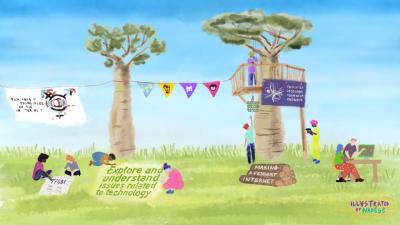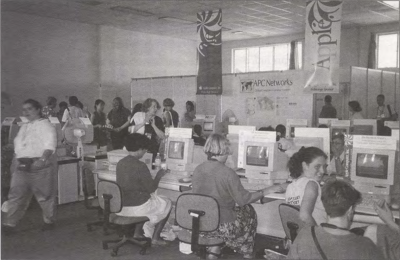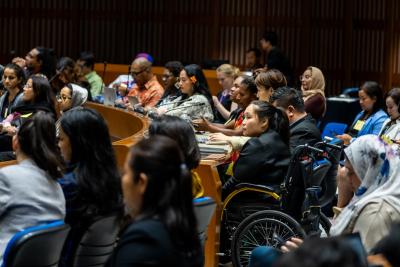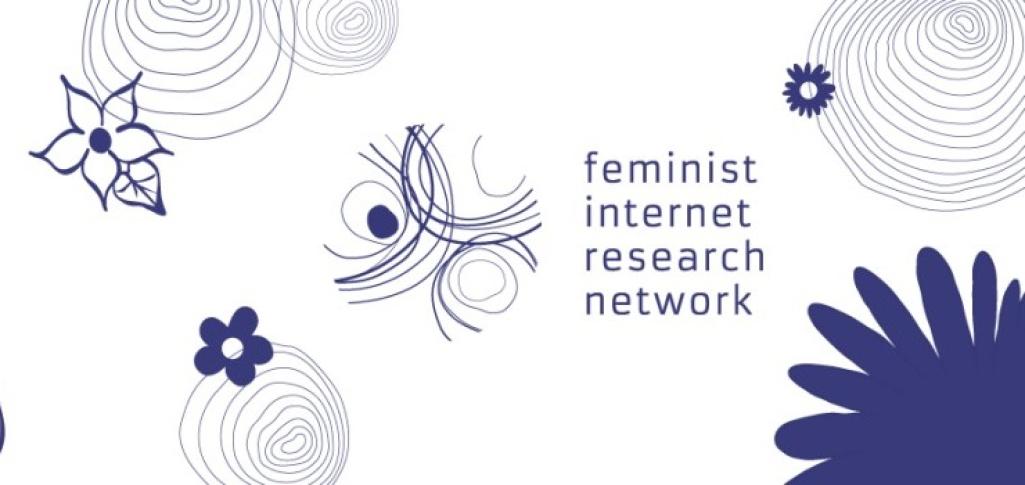
The Feminist Internet Research Network (FIRN) is a three-and-a-half-year collaborative and multidisciplinary research project led by the Association for Progressive Communications (APC), funded by the International Development Research Centre (IDRC).
The project draws on the study “Mapping research in gender and digital technology” carried out by APC and commissioned by IDRC, and the Feminist Principles of the Internet (FPIs) collectively crafted by feminists and activists, primarily located in the global South. The FIRN aims to build an emerging field of internet research with a feminist approach to inform and influence activism and policy making.
Background
There is persistent disparity in the comprehensive integration of and focus on gender in policy and research related to information and communications technology (ICT) – from unpacking digital rights, data gathering, research and analysis to policy making. Findings from the mapping study of research in gender and digital technology in middle- and low-income countries over the last decade (2006-2017) carried out by APC and commissioned by IDRC show that there are organisations that integrate gender-related concerns into their research agendas, but also highlight that there are gaps between research and policy making. The lack of investment in the subfield of gender and ICT research and non-recognition of critical and feminist work has an epistemic impact, and further, the lack of intersectionality in gender-related or feminist research has a discriminatory impact. Research agendas have to be linked to policy reform, as this has an impact on the effectiveness and value of research, activism and policy interventions.
The project
The Feminist Internet Research Network focuses on the making of a feminist internet as critical to bring about transformation in gendered structures of power that exist online and onground. Members of the network will undertake data-driven research that provides substantial evidence to drive change in policy and law and in discourse around internet rights. The broader objective is to ensure that the needs of women, gender diverse and queer people are taken into account in internet policy discussions and decision making.
Overarching research questions
- What forms of discrimination do women, gender diverse and queer people face because of social, political and economic changes driven by digital technology and the internet?
- What are the challenges and opportunities in policy, infrastructure and socio-cultural norms when it comes to the making of a feminist internet?
- How does the feminist internet research project contribute to methodological, theoretical and ethical shifts that will impact research on the internet?
Key areas of research
Based on the emerging areas and gaps in knowledge that were identified through the mapping study of research in gender and digital technology, the FIRN focuses on four thematic areas:
- Access (usage and infrastructure)
- Big data and its impact on vulnerable populations
- Online gender-based violence
- Gendered labour in the digital economy.
Domains of change
Inspire new methodological approaches, centred around the lens of feminism: Research studies and exchanges carried out by the network will strengthen research capacity and practices in the emerging field of gender and digital technology and research on digital technologies overall by facilitating intersectoral and intersectional perspectives, peer exchanges and partnership building.
Advocacy and movement building: Research from the network will deepen discussions among affected populations and advocacy targets by providing new insights, inspiring new ideas and shifting the framework of response to key thematic areas. Advocacy targets include activists, practitioners, researchers, academics, and tech developers, especially those who engage with issues on digital technology and human rights.
Global shifts through policy forums: Research by the network is intended to yield a nuanced and more accurate picture of the issues, grounded in the realities of heterogeneous communities. This will help inform policy advocacy work and policy development on issues of access and online gender-based violence in particular.
Phase 1
Selected project proposals
Project title: A feminist approach to AI and algorithmic decisions in Latin America: Building bridges for human rights advocacy groups / Host institution: Coding Digital Rights / Theme: Datafication, Economy and labour / Region: Latin America / Country: Argentina, Brazil and Chile.
Project title: Action-research on feminist autonomous networks / Host institution: Vedetas / Theme: Access, Online gender-based violence, Economy and labour / Region: Latin America / Country: Brazil.
Project title: After the Storm: Research and policy drafting for restoring policy dialogue against gender-based violence in Bulgaria / Host institution: BlueLink / Theme: Online gender-based violence / Region: East Europe / Country: Bulgaria.
Project title: Digital mediation of reproductive and care work in India: A feminist exploration / Host institution: CIS-India / Theme: Economy and labour / Region: Asia / Country: India.
Project title: Feminism, datafication and backlash in Brazil (LGBT) / Host institution: Latin American Centre on Sexuality and Human Rights (CLAM) / Theme: Online gender-based violence, Datafication / Region: Latin America / Country: Brazil.
Project title: Online gender-based violence and the costs of unequal access to freedom of opinion and expression for women and the LGBTQ community in Malaysia / Host institution: KRYSS Network PLT / Theme: Online gender-based violence / Region: Asia / Country: Malaysia.
Project title: Understanding online gender-based violence across Africa: A mixed-methods study / Host institution: Pollicy.org / Theme: Online gender-based violence / Region: Africa / Country: Kenya, South Africa, Senegal.
Project title: Understanding the gender disparity in Rwanda through an intersectional approach / Host institution: Research ICT Africa / Theme: Access / Region: Africa / Country: Rwanda.
Phase 2
Selected project proposals
- Project title: Measuring the Effects of Digital Violence on LGBTI+s on the Internet / Host institution: Kaos Gay and Lesbian Cultural Research and Solidarity Association (Kaos GL) / Theme: Online gender-based violence / Region: MENA / Country: Turkey.
- Project title: Women Digital Rights in Sudan / Host institution: Swewar Consulting / Theme: Online gender-based violence / Region: Africa / Country: Sudan.
- Project title: The left out: Accounting for transgender, non-binary and gender-diverse Africans’ experiences of online gender-based violence / Host institution: School of Journalism and Media Studies, Rhodes University / Theme: Online gender-based violence / Region: Africa / Country: South Africa.
- Project title: The holistic approach: Exploring women’s online FoE and FoA in the Democratic Republic of Congo / Host institution: core23lab / Theme: Online gender-based violence / Region: Africa / Country: DRC.
Phase 3
Selected project proposals
- Project title: Sexual health and rights implications of TFGBV toward women and LGBTQIA+ people in Egypt* / Host institution: Ganoubia Hora / Region: MENA / Country: Egypt.
- Project title: Colonial feminism as OGBV: Justifying Israel’s genocide in Palestine* / Host institution: Kohl Journal / Region: MENA / Country: Palestine.
- Project title: Resisting homophobia in Ethiopia / Host: Ethiopian. Queer. Ally. Feminist / Region: Africa / Country: Ethiopia.
- Project title: Black women and technology-facilitated gender based violence: A decolonial feminist exploration / Host institution: University of Cape Town / Region: Africa / Country: South Africa.
- Project title: Exploring technology-facilitated gender-based violence in online dating experiences among South African youths / Host institution: Independent Institute of Education (IIEMSA Campus) / Region: Africa / Country: South Africa.
- Project title: Uruguayan sex workers' image rights online / Host institution: O.TRA.S. / Region: LAC / Country: Uruguay.
- Project title: TFGBV/OGBV, its impacts on the experiences of Black Brazilian women and their stories of resistance and joy / Host institution: Instituto Minas Programam / Region: LAC / Country: Brazil.
- Project title: Feminist digital forensics: A study and a proposal for development / Host institution: MariaLab / Region: LAC / Country: Brazil, Ecuador, Bolivia, Mexico.
- Project title: Role of intersectionality in shaping experiences of online gender-based violence (OGBV) in transgender, non-binary and gender diverse (TNBGD) persons in India / Host institution: Sangath / Region: Asia / Country: India.
- Project title: Measurement and analysis of technology-facilitated gender-based violence in Tajikistan / Host institution: Women's Center "Gulrukhsor" / Region: Asia / Country: Tajikistan.
Advisory committee
The advisory committee for the FIRN network will ensure cohesiveness, balance in research topics, peer exchange and collective impact of the network, and its members have also played an important role in the selection of proposals for grants.
The advisory committee (October 2018-October 2019) comprises:
- Catalina Alzate, designer and researcher
- Helani Galpaya, LIRNEasia
- Mariana Viollaz, Centro de Estudios Distributivos, Laborales y Sociales (CEDLAS - Centre for Distributive, Labour and Social Studies)
- (Prof.) Dr. Nishant Shah, dean of graduate school, ArtEZ University of the Arts, the Netherlands
- Dr. Nicole Shepherd, independent researcher.
- Jac sm Kee, feminist activist, writer and researcher from Malaysia
- Ghiwa Sayegh, researcher, writer and translator based in Beirut, Lebanon.
Meta research
The FIRN includes a meta-research project that explores the methodological and ethical practices of the eight research partners’ projects. This task is being conducted by Dr. Nyx McLean, an academic and researcher specialising in gender, sexuality, digital counter/publics and communities, located in Cape Town. The meta-research will take a participatory intersectional feminist research approach, which means that all participants co-create/generate data, and that the researchers involved in the meta-research project are also generators of data.
Some relevant activities and outputs
- First network convening and research hackathon with the eight selected research partners.
- GenderIT.org special edition on methodology and ethics: "All that you walk on to get there: Feminist reflections on methodology, ethics and access in research”.
- Participation in local, regional and global internet policy spaces:
- Forum on Internet Freedom in Africa (#FIFAfrica), 23-26 September 2019, Ethiopia.
- Making a Feminist Internet: Movement building in a digital age in Africa, 28-31 October 2019, South Africa.
- Internet Governance Forum, 25-29 November 2019, Germany. Workshop: "Internet Governance and Sexuality”.
- CIS: Participation in Stakeholder Consultation on Digital Assets for Women’s Economic Empowerment, organised by UN Women and SEWA, on 6 December 2019.
- BlueLink: Annual Democracy Conference in Varna, Bulgaria, 29 February-1 March 2020.
- Data, AI and Society: Workshop organised by IDRC, Montevideo, March 2020.
If you want to keep updated on the project's activities follow FIRN on LinkedIn.
For further information on the project and opportunities for collaboration contact: wrp@apcwomen.org
(*) These projects are supported by APC WRP funds.

